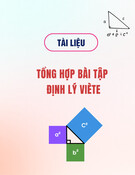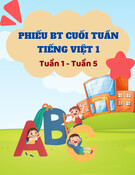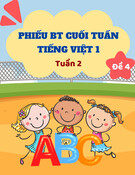
TR NG THCS KIM ĐNGƯỜ Ồ
Đ C NG ÔN T P ANH 9 H C KÌ IỀ ƯƠ Ậ Ọ
Năm h c : 2020- 2021ọ
A/GRAMMAR: ( Unit 1 –Unit 5 )
I.COMPLEX SENTENCES: (CÂU PH C)Ứ
- Main clause + connector (t n i) + subordinate clauseừ ố
Dependent adverbial clauses: (M nh đ tr ng ng ph thu c)ệ ề ạ ữ ụ ộ
1 -Adverbial clauses of time. M nh đ tr ng ng ch th i gianệ ề ạ ữ ỉ ờ
Begin with: after, before, until/till, when(ever), since, as, as long as (mi n là, v i đi u ki nễ ớ ề ệ
là), as soon as (ngay khi), by the time (that), directly, during the time (that), immediately, …
2 - Adverbial clauses of place. M nh đ tr ng ng ch n i ch nệ ề ạ ữ ỉ ơ ố
Begin with: where (n i), wherever (b t c n i nào), anywhere, everywhere. ơ ấ ứ ơ
3 - Adverbial clauses of reason. M nh đ tr ng ng ch lý doệ ề ạ ữ ỉ
Begin with: because, as, seeing (that), since
4 - Adverbial clauses of concession. (contrast clauses) (M nh đ ch s nh ng b )ệ ề ỉ ự ượ ộ
Begin with: although, though, even though, even if, much as…, while, whereas, however,
much/badly/good, etc., no matter how, no matter how much etc.
5 - Adverbial clauses of purpose. M nh đ tr ng ng ch m c đíchệ ề ạ ữ ỉ ụ
Begin with: so that, in order that, in case (phòng khi), for fear (that) (s r ng)ợ ằ
* Ta th ng hay dùng ườ will, can, would, could, may, might sau so that/ in order that
6 - Adverbial clauses of result. M nh đ tr ng ng ch k t quệ ề ạ ữ ỉ ế ả
Begin with: clause, so (vì v y) + clause; ậso + adj/adv + that…; such (a) + noun + that …
(quá…đn n i)ế ổ
2. PHRASAL VERBS: C M ĐNG TỤ Ộ Ừ
* Some common phrasal verbs: M t vài c m đng t thông d ngộ ụ ộ ừ ụ
- apply for (a job): n p đn (xin vi c) ộ ơ ệ - come across sb/sth: tình c g pờ ặ
- break down: b hị ư - close down: ng ng ho t đng, đóng c a ti m ừ ạ ộ ử ệ
- bring someone up: nuôi n ng (con cái) ấ- clean sth up: lau chùi
- carry out: th c hi n, ti n hành (k ho ch, d án)ự ệ ế ế ạ ự - cheer sb up: đng viên, làm cho ai vuiộ
lên
- cool down: bình tĩnh l i - cut down on sth: c t gi m cái gì đóạ ắ ả
- deal with: gi i quy tả ế
- face up to: ch p nh n, đi m t, gi i quy tấ ậ ố ặ ả ế

- find out: tìm ra, phát hi nệ
- get off: xu ng xe- get on: đi lên (xe buýt, tàu, xe máy, …)ố
- get on: ti n b = to make progressế ộ - get on with sb: hòa h p, hòa thu n v i aiợ ậ ớ
- get out: đi ra ngoài, cút ra ngoài - get over sth: v t qua, kh i (b nh), ch p nh n ượ ỏ ệ ấ ậ
- get up: th c d y (ra kh i gi ng r i) ứ ậ ỏ ườ ồ - give up (on) sth: t bừ ỏ
- go around: đi vòng vòng - go down: gi m, đi xu ngả ố
- go off: reo, đ chuông, ổ- go on: ti p t c = carry on, keep onế ụ
- go over: ki m tra = examineể
- go up: tăng, đi lên - grow up: l n lên, tr ng thànhớ ưở
- keep on doing sth: ti p t c làm gìế ụ - keep up sth: hãy ti p t c phát huyế ụ
- look after someone: chăm sóc ai đó - look around: nhìn xung quanh
- look at sth/sb: nhìn vào - look down on sb: khinh th ng ai đó ườ
- look for s.o/sth: tìm ki m ai/ cái gìế- look into sth: nghiên c u, xem xét, đi u tra cái gìứ ề
- look forward to sth/ look forward to doing sth: mong m i, trông mong đi u gì, làm gìỏ ề
- look sth up: tra c u, tra nghĩa t nào đóứ ừ - look up to sb: tôn tr ng ai đóọ
- live on: s ng nh , ph thu c vào (kho n thu nh p, h tr )ố ờ ụ ộ ả ậ ỗ ợ
- make sth up: b a, ch ra đi u gì đó = invent ị ế ề - make up one’s mind: quy t đnhế ị
- pass down: l u truy n (th h này sang th h khác) ư ề ế ệ ế ệ - put sth down: ghi chú cái gì
- put sth off: trì hoãn, t m d ng vi c gìạ ừ ệ - put sth on: m c cái gìặ
- put sth away: c t cái gì đó điấ- pull down: phá h y, đp, d bủ ậ ở ỏ
- run out: c n ki t, h t = to be used upạ ệ ế - set up sth: thành l p, thi t l p cái gìậ ế ậ
- set off: kh i hành đi đâuở- show up: xu t hi n, có m t = turn upấ ệ ặ
- slow down: ch m l i- show sb around: d n ai đi tham quan xung quanhậ ạ ẫ
- take away: l y đi, mang điấ- warm up: kh i đng. hâm nóng (th c ăn)ở ộ ứ
- take off: c t cánh (máy bay), tr nên th nh hành, đc a chu ng (ý t ng, s n ph m)ấ ở ị ượ ư ộ ưở ả ẩ
- take sth off: c i cái gì đóở- take over: ti p qu n, k t c, giành l y, k th aế ả ế ụ ấ ế ừ
- take on: đm nh n, gánh vácả ậ - turn down: v n nhặ ỏ
- turn sth/s.o down: t ch i, lo i cái gì, ai đó- turn up: đn, có m t, xu t hi n = show upừ ố ạ ế ặ ấ ệ
- turn off: t t- turn on: b t, mắ ậ ở - turn up: v n l n lênặ ớ
- wake up: (t ) th c d y (còn n m trên gi ng) - wake someone up: đánh th c ai d yự ứ ậ ằ ườ ứ ậ
II.COMPARISONS OF ADJECTIVES AND ADVERBS
(CÁC HÌNH TH C SO SÁNH C A TÍNH T VÀ TR NG T )Ứ Ủ Ừ Ạ Ừ
1. Degrees of comparisons:
1.Equal degree
(So sánh
b ng)ằ
S1 + be/ V + as + adj / adv + as + S2 + aux (tr đng t )ợ ộ ừ
E.g: He is as old as my father.
S + be/V + the same+( noun) as + noun (pronoun)
My house is the same height as yours.

Unequal
degree
(So sánh
không b ngằ
S1 + V (ph đnh)ủ ị + as/so + adj/adv + as + S2 + aux
E.g: He is not as/so old as my father.
2.
Comparatives
(So sánh h n)ơ
TÍNH T NG NỪ Ắ
S1 + be/ V + adj/ adv + er + than + S2 + aux
E.g: You are thinner than he (is).
TÍNH T DÀIỪ
S1 + be/V + more + adj/ adv (long) + than + S2 + aux
E.g: He is more intelligent than I (am).
3. Superlatives
(So sánh nh t)ấ
TÍNH T NG NỪ Ắ
S + be/V + the + adj/ adv (short) + est + (noun + in/of …..)
E.g: Nam is the tallest student in my class.
TÍNH T DÀIỪ
S + be/ V + the most + adj/ adv(long) + (noun + in/of …..)
E.g: He is the most intelligent student in my class.
* Note: 1/ Chúng ta cũng có th s d ng nh ng t nh n m nh nh : ể ử ụ ữ ừ ấ ạ ư much, a lot, far, slightly, a
bit, no, any, ... tr c các hình th c so sánh h nướ ứ ơ
E.g: Her husband is much/ far/ a lot/... older than her. (Ch ng cô y l n tu i h n cô y ồ ấ ớ ổ ơ ấ nhi uề)
We feel a bit/ a little/ slightly tired after the trip. (Chúng tôi c m th y ả ấ h iơ m t sau chuy n đi)ệ ế
2/ Ta có th s d ng ể ử ụ the second, the third,… tr c hình th c so sánh nh t đ th hi n thướ ứ ấ ể ể ệ ứ
b cậ
E.g: Osaka is the second largest city in Japan. (Osaka là thành ph ốl n th haiớ ứ Nh t B n)ở ậ ả
3/ Ta cũng có th dùng ểby far (h n nhi u, h n h n) ơ ề ơ ẳ đ nh n m nh so sánh nh tể ấ ạ ấ
E.g: Army is by far the smartest. (Army thông minh nh t, h n m i ng i nhi u)ấ ơ ọ ườ ề
Special adjectives/ adverbs:
N
o
Equal
degree
Comparative Superlative Meaning
1. bad/badly/ worse worst T i, d , t , kémồ ở ệ
2. good/ well better best T t, gi i, kh eố ỏ ỏ
3. Many/much more most Nhi uề
4. little less least Ít
5. far farther/ further farthest/ furthest Xa (distance) / R ng (range)ộ
6. old older/ elder oldest/ eldest Già, cũ (for all)/ (brother/ sister)

III. REPORTED SPEECH.
(CÂU T NG THU T)ƯỜ Ậ
CÁC NGUYÊN T C CHUNGẮ
1. Thay đi đng t trong câu t ng thu tổ ộ ừ ườ ậ
Said said that→
Said to sb told sb→
2. Thay đi thì trong câu t ng thu t:ổ ườ ậ
Khi đng t t ng thu t ộ ừ ườ ậ ở các thì quá khứ, chúng ta đi thì trong câu gián ti p nh sau:ổ ế ư
Simple present (V(s/es)) Simple past (V2/ed )
Simple past (V2/ed) Past perfect ( had + V3/ed )
Simple future (will/ shall + V0 ) Future in the past ( would/ should + V0 )
Present continuous (am/is/are + V-ing) Past continuous (was/ were + V-ing )
Past continuous (was/were + V-ing) Past perfect continuous / past continuous
Future continuous (will + be + V-ing) Future continuous in the past (would + be + V-ing)
Present perfect (have/has + V3/ed) Past perfect (had + V3/ed)
Past perfect (had + V3/ed) Past perfect (had + V3/ed)
Future perfect (will + have + V3/ed) Future perfect in the past (would + have + V3/ed)
can could
may might
must had to
3. Thay đi v đi t nhân x ng, đi t s h u, tính t s h u:ổ ề ạ ừ ư ạ ừ ở ữ ừ ở ữ
Câu tr c ti pự ế Câu gián ti pế
Ngôi th nh tứ ấ Đô thành ngôi c a ng i nói (cùng ngôi v i ch t trong m nh đỉ ủ ườ ớ ủ ừ ệ ề
chính
Ngôi th haiứĐi thành ngôi c a ng i nghe (cùng ngôi v i tân ng trong m nh đổ ủ ườ ớ ữ ệ ề
chính)
Ngôi th baứKhông thay điổ
4. Thay đi t ch đnh, các tr ng t và c m t ch th i gian và n i ch n:ổ ừ ỉ ị ạ ừ ụ ừ ỉ ờ ơ ố
DIRECT SPEECH INDIRECT SPEECH
this that
these those
now then, at that time, immediately
here there
today that day
ago before
yesterday the day before, the previous day
tomorrow the next day, the following day, the day after
this year / month / week that year / month / week
last night / year / month / week the night / year / month / week before;
the previous night / year / month / week.
next year / month / week the year / month / week after;

the following year / month / week.
a year / month / week ago a year / month / week before;
a year / month / week earlier
The day before yesterday Two days before
The day after tomorrow Two days after
Tonight That night
CÁC LO I CÂU T NG THU TẠ ƯỜ Ậ
Tóm t tắCâu gián ti pế
Statements
(Câu phát bi u)ể
* S + said + (that) + S + V
* S + told + O + (that) + S + V
Commands
(Câu m nh l nh)ệ ệ
* S + told/asked + O + to V(inf)
* S + told /asked+ O + not + to V0
Wh-questions
(Câu h i n i dung)ỏ ộ
* S + asked + (O) + wh-… + S + V
* S + wondered + wh-… + S + V
* S + wanted to know + wh-… + S + V
Yes-no questions
(Câu h i có không)ỏ
* S + asked + (O) + if / whether + S + V
* S + wondered + if /whether + S + V
* S + wanted to know + if / whether + S + V
* CÁC TR NG H P ĐC BI T:ƯỜ Ợ Ặ Ệ
I. REPORTED QUESTIONS WITH QUESTION WORDS BEFORE TO-INF:
(T ng thu t câu h i v i các t đ h i đng tr c to-inf)ườ ậ ỏ ớ ừ ể ỏ ứ ướ
- D ng t ng thu t này th ng đi kèm v i các đng t : ạ ườ ậ ườ ớ ộ ừ ASK, WONDER, (NOT) BE SURE,
HAVE NO IDEA (KHÔNG BI T), (NOT) KNOW, (NOT) DECIDE, (NOT) TELL.Ế
WH-QUESTIONS: S + Verb (ask, wonder,..) + (O) + Wh-question + to-inf
*Ngo i tr WHY không th đi kèm v i to-infạ ừ ể ớ
Ex: “What should I do” she said She wondered what to do.
We don’t know who we should contact We don’t know who to contact
YES-NO QUESTIONS: S + verb (ask, wonder,..) + (O) + WHETHER + To-inf
* D ng này không th dùng v i IFạ ể ớ
Ex: “Should I tell my parents what I really think?” She wondered
She wondered whether to tell her parents what she really thought.
IV. USED TO: ĐÃ T NGỪ
* Use: nói v thói quen, hành đng th ng xuyên l p đi l p l i trong quá kh nh ng gi không ề ộ ườ ặ ặ ạ ứ ư ờ
còn n a.ữ
Ex: When I was a child. I used to cry all days and nights.




![Bài tập so sánh hơn và so sánh nhất của tính từ [kèm đáp án/mới nhất]](https://cdn.tailieu.vn/images/document/thumbnail/2025/20250808/nhatlinhluong27@gmail.com/135x160/77671754900604.jpg)
![Tài liệu tham khảo Tiếng Anh lớp 8 [mới nhất/hay nhất/chuẩn nhất]](https://cdn.tailieu.vn/images/document/thumbnail/2025/20250806/anhvan.knndl.htc@gmail.com/135x160/54311754535084.jpg)




![Tài liệu Lý thuyết và Bài tập Tiếng Anh lớp 6 [Mới nhất]](https://cdn.tailieu.vn/images/document/thumbnail/2025/20250802/hoihoangdang@gmail.com/135x160/18041754292798.jpg)





